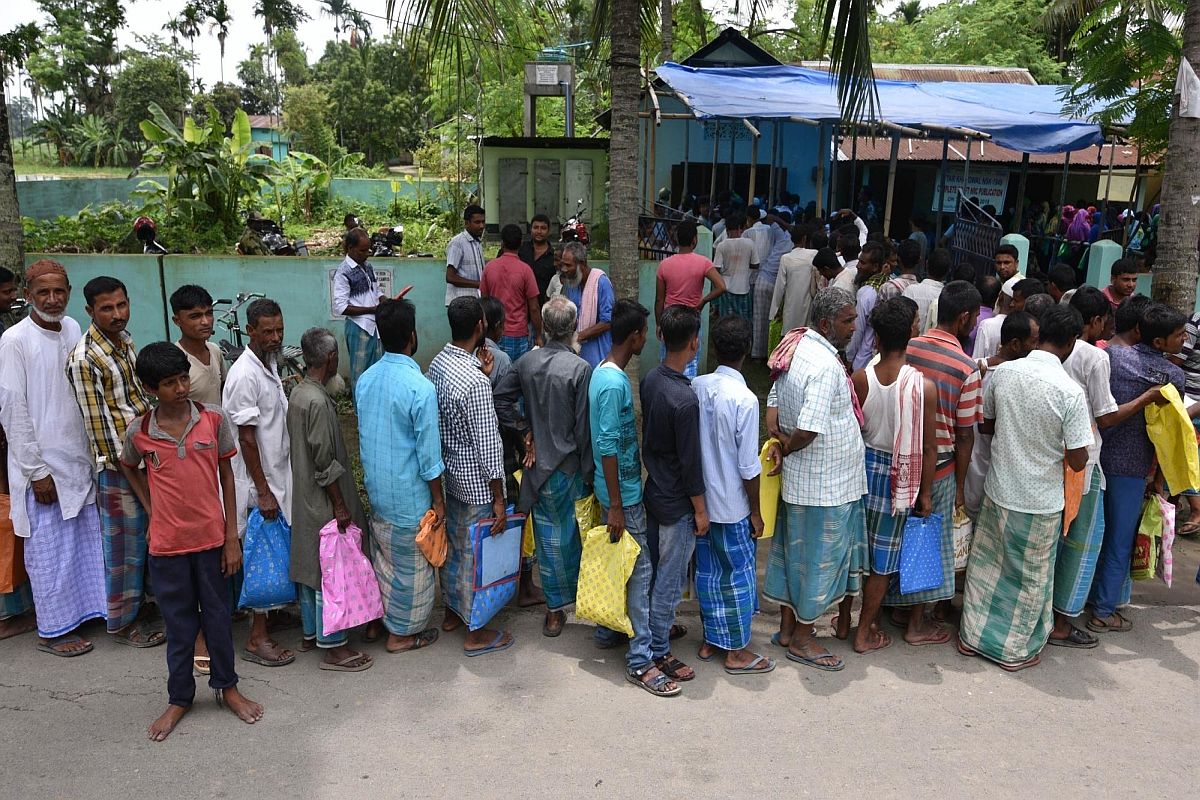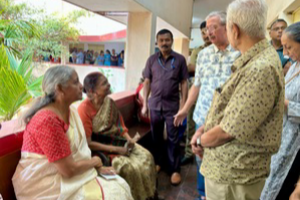Compared to the normal detention of Assam’s tribunal-declared “foreigners”, these Covid-19 times have brought a semblance of relief. A Supreme Court order facilitated the release of those who had served more than two years in the state’s detention centres. Soon after, as some detainees stood under free skies, it has to be said that Covid-19 and the nation-wide lockdown spurred consideration for their release on humanitarian grounds.
Each of the released detainees has a story to tell about how they landed up there despite having lived the life of an Indian citizen – starting from 102- year-old Chandradhar Das to Kalpana Biswas, who grew up in a detention centre from the age of six to 15 until when she was released. One must remember that people are supposed to be kept in a detention centre only until they can be sent back to their country of origin and the period cannot be indefinite. This moral and human rights consideration weighed on the mind of the SC.
The stamp of a “foreigner” plays havoc in the lives of these people as they are rendered stateless and condemned to be without any rights. It has been argued in legal scholarship that statelessness can be considered the “right to have rights”, as those whose rights are taken away need to be endowed with all human rights and dignity, according to the United Nations’ proclamation “all human rights for all humans” or the Civil Rights Movement’s “no human being is illegal”.
In a good sense, returning their lost rights as a kind of reparation and non-refoulment is a step towards ensuring justice to the detainees who have no country to return to. Partition and post-Partition India’s tryst with recognising its own displaced as citizens took a heavy toll on humanity. The narrative of huge human displacement and loss of everything among the Partition victims and their subsequent humiliation after repatriation to India, fans an emotional and angry outburst at the perceived perpetrators.
But the Partition of India was such a catastrophic event that the perpetrators became victims after a while, while the original victims carried on with a fundamental wound of existence in their heart and minds that swelled up into a non-negotiable pain. The grief and mourning attached to Partition’s genocidal violence and its continued “narrativisation” add to the pain of too many of these humans thrown into detention centres.
The existential plight of being termed a “foreigner” in one’s ancestors’ country established a sempiternal sadness that brought a permanent roller coaster of hardships, compulsion and scarcity in everyday life.
A peaceful chaos mixed with a yearning for wellbeing, security and justice haunted them in the promised land of India. These people bore the brunt of the sixyear- long anti-foreigners movement in Assam and became the bone of contention as “citizens”. The state’s subaltern peasantry of Bengali origin who became part of colonial Assam in 1874 were subjected to a strict line system by the British as they were not allowed to move into areas demarcated for ethnic origin peoples.
Partition, thereafter, brought some more displaced people from erstwhile East Bengal into the state. Meanwhile, a colonially reconstituted Assam got approximately 7,000 square kilometres of land from East Bengal in its 1826 geopolitical territory. Areas like Goalpara that had been part of the Rongpur district of East Bengal became part of Assam. Sylhet became part of Assam in 1874.
With the exception of two and a half police stations and some part of the Kacahari kingdom, the rest of Sylhet was merged with Pakistan in 1947 after a questionable referendum. Such arbitrary separation, partition and realignments in a large area of modern Assam, not so far back in colonial history, had sown seeds of suspicion. Legal instruments such as an Assam-specific National Register of Citizens to exclude people of post-1971 Bangladeshi origin sent about 1,300 people to detention camps by a procedure carried through Foreigners’ Tribunals, which are supposed to determine country of origin of a suspect.
How does a tribunal decide country of origin and citizenship, shifts the onus of proof on the accused and tries them in denial of natural justice? Specifically, a tribunal is not supposed to deal with matters not listed under the Constitutional provisions of 323A and B. Foreigners’ Tribunals formed under the Foreigners’ Act of 1946 and subsequent Foreigners’ Tribunal Order of 1964 are somewhat extraneous to the scope of Article 323. The larger concerns are many – the so-called foreigner is not to be treated as a criminal, but is often lodged in a jail along with hardened criminals.
Former Chief Justice of India, the late Altamas Kabir stated in 2015 that keeping suspected foreigners alongside other convicts in the same jail is a violation of human rights. Such an apparent wrong practice has been raised before courts of law many a time citing the inhuman conditions under which the suspected foreigners have to spend their time.
In its latest judgment on 12 April, a SC bench comprising Chief Justice SA Bobde, Justice L N Rao and Justice M Shantanagoudar ordered the release of detainees who had served for two years in detention camps by recognising the fact that keeping them there during the Covid-19 pandemic posed a grave health risk.
After the order, recently released detainee Nurul Nessa from Halflong stated her experience of being exploited by convicted detainees, for which she suffered a serious nervous breakdown during her detention. A few months ago, the Assam government had to constitute a medical team to ensure the health and well-being of detainees after a hue and cry was raised over the death of 65-year-old Dualal Chandra Paul in Sonitpur Jail without proper healthcare.
Though it seems too little too late, a step to provide proper healthcare, food and other amenities to suspected and declared foreigners in detention camps establishes the fact of derogation of human dignity in such premises. Though the SC order is an extension of general amnesty to other kinds of detainees, the release of many from detention centres across Assam has brought out tales of a flawed foreigners’ determination procedure as well as their imprisonment that violates ends of justice.
This brings us back to re-understanding the whole idea of “preventive detention” to which suspected foreigners are currently subjected to in Assam. The detention of a suspected foreigner is only to deport them to their country of origin, if the legal process could establish that at all. Needless to state that establishing country of origin is the task of a larger substantive procedure that has to follow precepts of special international law in terms of jurisprudence, which is not as simple as intended in a colonial era law like the Foreigners’ Act of 1946.
In case of many lodged in detention centres, if not most, the origin remains in Assam and India. This shows that non-immigrant people of Bengali origin are often turned into “foreigners” in Assam. This menacing consequence of a supposed juridical procedure is the most disparaging form of enforced statelessness that the Constitution of India never warranted. It has also caused a massive humanitarian and politico-legal crisis for minorities in Assam.
This also gives rise to quite blatant racism that works through a legal mechanism and goes against the linguistic and religious minorities of the state. The whole conundrum of historical facts of the constitution of Assam by ceding areas of erstwhile un-partitioned Bengal and India gives us the right cues to understand the construction of the native versus foreigner dichotomy.
(The writer is a philosopher and a human rights activist based in Shillong)










